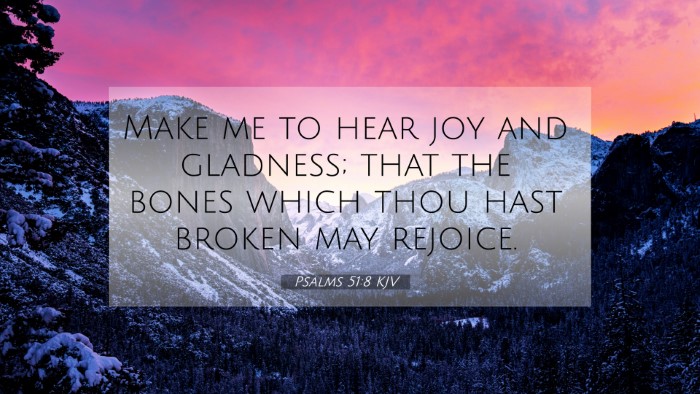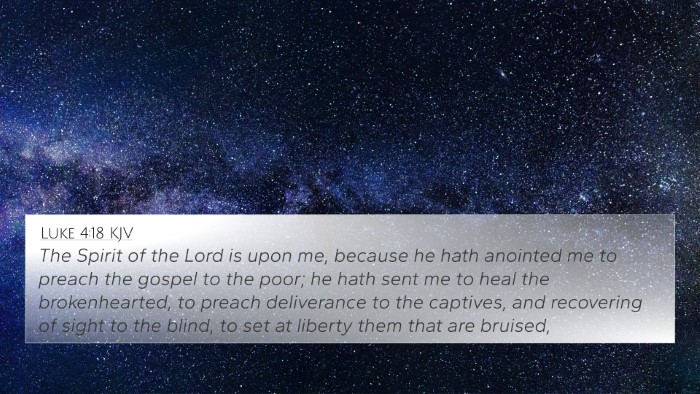Understanding Psalms 51:8
Bible Verse: "Make me to hear joy and gladness; that the bones which thou hast broken may rejoice." (Psalms 51:8)
Summary of Meaning
Psalms 51 is a profound passage of repentance attributed to King David after his sin with Bathsheba. The verse Psalms 51:8 expresses a deep desire for restoration and healing following the spiritual and emotional turmoil caused by sin. The plea to "hear joy and gladness" signifies a longing for a return to a joyful state after experiencing the weight of guilt.
Insights from Public Domain Commentaries
-
Matthew Henry:
Henry emphasizes the state of despair and brokenness that sin brings. Here, David acknowledges his spiritual pain and asks for a restoration of joy and gladness in his heart. The "bones which thou hast broken" illustrates the physical and emotional impact of sin, portraying David's sense of loss and sorrow.
-
Albert Barnes:
Barnes notes that the request for joy indicates a restoration to a previous state of happiness. He interprets the broken bones as a metaphor for David's guilt and suffering due to his sins. Barnes highlights that true repentance involves not only sorrow for sin but also a longing for the joy of salvation.
-
Adam Clarke:
Clarke delves into the psychological state of the sinner. He argues that brokenness due to sin can lead to physical symptoms akin to those of an injured body. Clarke asserts that once one repents, it is vital to seek restoration through joy that can only come from God.
Bible Verse Cross-References
- Psalms 30:11: "Thou hast turned for me my mourning into dancing: thou hast put off my sackcloth, and girded me with gladness."
- Isaiah 61:3: "To appoint unto them that mourn in Zion, to give unto them beauty for ashes, the oil of joy for mourning, the garment of praise for the spirit of heaviness."
- Lamentations 5:21: "Turn thou us unto thee, O Lord, and we shall be turned; renew our days as of old."
- Matthew 5:4: "Blessed are they that mourn: for they shall be comforted."
- 2 Corinthians 7:10: "For godly sorrow worketh repentance to salvation not to be repented of: but the sorrow of the world worketh death."
- James 4:8: "Draw nigh to God, and he will draw nigh to you. Cleanse your hands, ye sinners; and purify your hearts, ye double minded."
- Romans 5:3-5: "And not only so, but we glory in tribulations also: knowing that tribulation worketh patience; and patience, experience; and experience, hope: and hope maketh not ashamed; because the love of God is shed abroad in our hearts by the Holy Ghost which is given unto us."
Thematic Connections with Biblical Texts
The themes of repentance, restoration, and the return of joy resonate throughout the scriptures, creating a narrative that links various scriptures. The emotional aspect of sin and the subsequent appeal for joy is a common motif that can be seen across different books in the Bible. This verse (Psalms 51:8) provides a launching point for exploring these themes across a range of biblical contexts.
Cross-Referencing Bible Study Methods
- Utilize a Bible concordance to find related verses discussing themes of repentance and joy.
- Examine a cross-reference Bible study guide to discover the connections between Psalms 51:8 and New Testament scriptures.
- Engage in thematic Bible verse connections by comparing passages that discuss the transformative power of God’s forgiveness.
- Explore tools for Bible cross-referencing to dig deeper into the messages surrounding joy and restoration after repentance.
Conclusion
Psalms 51:8 encapsulates the heart of repentance, emphasizing the desire for joy and healing that follows a period of brokenness caused by sin. Through the combined insights of respected commentators and systematic cross-referencing, one can see the profound connections this verse has with the overall narrative of redemption in the Bible.
Further Reflection
As believers delve into the depths of Psalms 51:8 and its accompanying verses, they can appreciate the transformative journey from sorrow to joy that God offers through genuine repentance and His unfailing love. Understanding these interactions in scripture can enrich one’s spiritual growth and prepare for deeper Bible study.

















